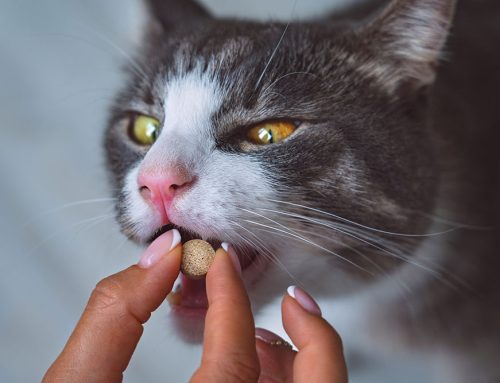The pancreas is a multifunctional organ that controls two main body systems—endocrine and exocrine. Pancreatic endocrine cells produce insulin and glucagon to regulate blood sugar, and these cells’ damage leads to diabetes. Approximately 98% of the pancreas serves exocrine functions—producing digestive enzymes that help break down and absorb foods’ nutrients. Pancreatic inflammation (i.e., pancreatitis) is caused by enzyme overproduction and poorly timed activation that allows the enzymes to damage the pancreas’s own healthy cells.
Pancreatitis, which has many potential causes, can be acute or chronic, and some pets are more prone to the disease than others. Pets can develop pancreatitis after eating a particularly fatty meal or treat, making this a common problem around the holidays. Our Alisos Animal Hospital team regularly treats pancreatitis, and we can teach you to identify your pet’s risk factors and important signs.
Pet pancreatitis risk factors and causes
Research shows that veterinarians cannot pinpoint the underlying cause in 90% of pancreatitis cases. Approximately 10% of pancreatitis cases result from dietary indiscretion—pets eating foods too rich for their body to process. Despite no known cause, some pets develop pancreatitis more often than others, including those who:
- Have a dietary indiscretion
- Have diabetes or Cushing’s disease
- Have high blood triglycerides (i.e., cholesterol)
- Have liver or intestinal disease
- Belong to certain breeds (e.g., miniature schnauzer, Yorkshire terrier, dachshund, poodle, sled dog breeds)
- Undergo surgery or anesthesia
- Take certain drugs (e.g., seizure medications, aspirin derivatives, estrogen, diuretics)
- Have underlying infections (e.g., toxoplasmosis in cats, babesiosis in dogs)
Pet pancreatitis signs
Pancreatitis can be short term (i.e., acute) or long term (i.e., chronic), and the condition’s signs may overlap between each type. Often, a pet with acute pancreatitis has more severe signs, and one with a chronic case has ongoing or low-level signs, or no signs. Your pet’s pancreatitis signs may include:
- Vomiting
- Poor appetite
- Abdominal pain
- Diarrhea
- Dehydration
- Lethargy
Pet pancreatitis diagnosis
Based on your pet’s clinical signs, your veterinarian may suspect pancreatitis, and will order blood and imaging tests to confirm. An acutely ill patient’s diagnosis is easier than for a pet who has chronic pancreatitis, showing vague or mild signs. Tests to diagnosis pancreatitis, and rule out other diseases, will likely include:
- Complete blood count (CBC) and blood chemistry panel
- Urinalysis
- Abdominal X-ray
- Abdominal ultrasound
- Specialized pancreatitis blood testing (e.g., Spec cPL, Spec fPL, Snap cPL, Snap fPL, Precision PSL)
Pet pancreatitis treatment
Acute pancreatitis is this condition’s most severe form, and usually requires hospitalization to stabilize pets and help avoid complications. Hospitalized pets receive intravenous (IV) fluids, antinausea, antacid, and pain medications, and occasionally antibiotics.
Once diagnosed, a pet who has chronic pancreatitis usually responds well to outpatient therapy and a low-fat, prescription, or home-prepared diet. These pets may require additional medications or supplements to support the gastrointestinal tract. Treatment to correct underlying risk factors will also help control pancreatitis and prevent acute flare-ups.
Pet pancreatitis complications
Pancreatic inflammation can damage or destroy important pancreatic cells, resulting in secondary diseases such as exocrine pancreatic insufficiency (EPI), which—because patients lack digestive enzymes—causes chronic diarrhea, weight loss, and malnutrition, or an insulin deficiency that results in high blood sugar, weight loss, and increased thirst and urination. These conditions are manageable with life-long treatment, but often lead to additional complications.
Severe, acute pancreatitis can cause systemic inflammation and complications, such as clotting problems or organ failure, which can be life-threatening despite appropriate treatment. Approximately half of patients who have severe pancreatitis may die.
Preventing pet pancreatitis

The most effective strategy to prevent your pet from developing pancreatitis is to avoid sudden diet changes, and prevent your furry pal from eating table scraps or getting into the trash bin. High-risk breeds, especially the miniature schnauzer, should have annual or biannual blood tests that assess their pancreatic function, and glucose, cholesterol, and triglyceride levels. A low-fat diet can also help prevent your pet from developing pancreatitis if they have one or more risk factors.
Most pets’ pancreatitis is manageable, but the condition can also threaten their life or cause long-term complications. If your pet is vomiting or has diarrhea, schedule an appointment with our Alisos Animal Hospital team. If you have a high-risk pet, talk with your veterinarian about long-term dietary changes and other measures to reduce your furry pal’s overall pancreatitis risk.








Leave A Comment